Solar Energy Conference: Procedures Need to Be Stepped Up
ZAGREB, 1 Oct 2021 - The solar sector is developing very slowly in Croatia even though the price of solar energy has never been lower, hence it is necessary to encourage greater efficiency by the competent institutions and to educate citizens, a two-day solar energy conference on the island of Hvar heard on Friday.
"The price of electricity from solar power plants today is lower than ever but Croatia's solar sector is developing very slowly and the relevant procedures need to be stepped up and people need to be educated," Professor Neven Duić of the Zagreb Faculty of Mechanical Engineering and Naval Architecture said at the conference.
The conference, entitled "Days of the Sun", brought together key stakeholders in Croatia's energy transition - members of the academic community, equipment producers, representatives of the banking system, investors, regional and local government officials as well as representatives of state institutions and ministries.
Apart from discussing various financial models for the solar sector and its launching, the conference will discuss the new legislative framework for the green transition, the future of photovoltaic power plants and solar technology in Croatia, innovations and application of solar energy in the business sector, the use of renewable energy sources in agriculture, and the implementation of the EU Green Deal at the national level.
"Local government has an opportunity to be more active in the coming period to inform citizens and promote the use of renewable sources, develop strategies and plans and actively participate in investments... these projects bring concrete benefits that can have a positive effect on the communities they govern," said Maja Jurišić of the Island Movement association, one of the organisers of the conference.
She underscored that renewable energy sources should be treated as a public good.
The director of SolarPower Europe, Walburga Hemetsberger, underscored that the solar energy sector was expected to grow significantly over the next five years, primarily due to the acceptable costs of such projects.
SolarPower Europe is a leading European organisation of stakeholders in the use of solar energy and it comprises research centres, banks, investors, entrepreneurs and others in the solar energy sector.
Croatia, Full of Poisoned Cats? The Dark Side of Dalmatia's Streets
September 3, 2020 - “Croatia, Full of Life!” says the national tourist board, but are they aware of all of the poisoned cats? A closer look at the animal issue plaguing Dalmatia's streets.
Street cats have become a symbol of Croatia, and whether you find them fishing on the coast, in bins, or enjoying a bit of ‘fjaka’ on an ancient stone wall, you’ll be hard-pressed to miss one while you're here.
But there is a dark side to our furry friends in Dalmatia, something I could never imagine in a place of so much beauty. Cat poisonings.
Growing up in California, my family always had cats. Because we lived on acres of citrus and avocado trees, we'd often wake up to litters in our shed or on top of our cars before I was driven to school. While we found homes for some, we raised others and ensured they were part of our family. Some we had for over 15 years, and all had passed before we moved to Croatia.
Without the responsibility of house pets for the first time in years, the thought of adopting an animal here hardly crossed my mind. And to be honest, I went four years in Split without taking any in. That is, until a kitten drove under our car for 20 minutes before falling out in the middle of the highway, which I heard only thanks to a hunch in my gut that something wasn't right. Suzy drove home with us that day and became my first kitten love in Croatia. Just over two months later, a 3-week old kitten was abandoned by its mother on a rainy Sunday night near my home, and while I tried finding him a forever home, Ziggy became a Rogulj, too. And that’s only the beginning.
However, it wasn’t until I rescued Ziggy that I became wholly exposed to the depths of the cat community in Split and Dalmatia. While I had friends actively involved on the streets or Facebook, I was often hesitant to join for fear of uncovering its somber side. Part of me enjoyed being blissfully unaware, thinking that the street cats here are healthy, happy, and have homes, as many people want you to believe. Unfortunately, it’s far worse than I’d ever imagined - and for anyone with the slightest bit of compassion, impossible to turn your head.
Not only do cities seldom help in sponsoring sterilizations for street cats (there are a few exceptions, like Stari Grad, which I will go into later), but many citizens believe that cats are pests, and pests must go before the tourists arrive. This is where the act of poisoning comes in.
At the beginning of August, Jutarnji List reported on 17 cats that were either poisoned, beaten, or drowned on the island of Hvar in a matter of weeks, terrifying tourists who left their accommodation because they found a dead cat in the courtyard. They added that dog owners were scared to leave their homes, and parents were hesitant to take their children to playgrounds for fear of them coming across traces of poison. The poison used, they said, was potent, and nothing anyone, let alone a cat, should come into contact with.
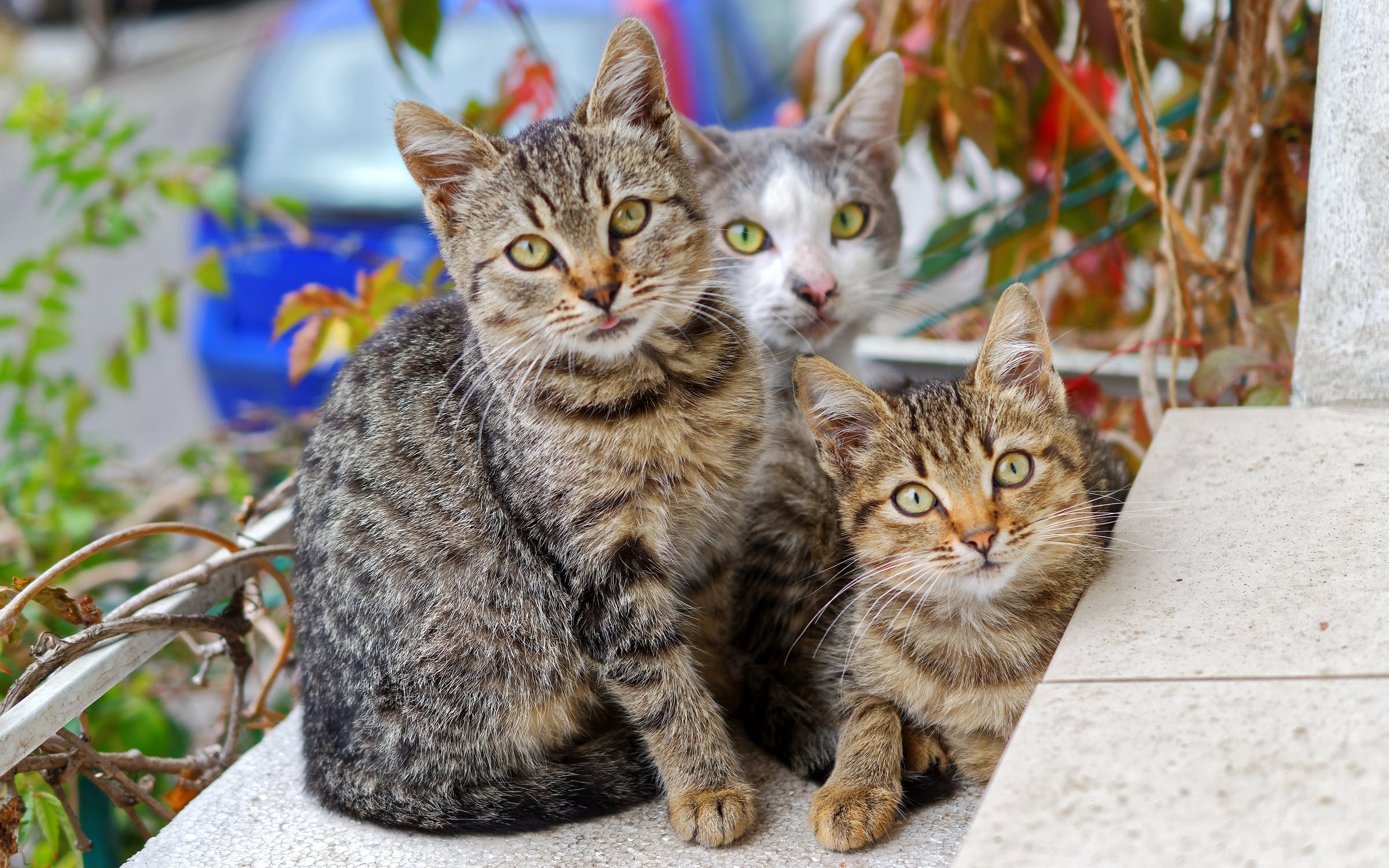
Pexels
Hvar, however, is only one example. Kelly Parslow, an ex-pat who has lived in the village of Osibova on Brac for years, has lost eight cats to poisonings.
“I believed foolishly that the first time it was an accidental poisoning. I was aware that cats were often poisoned here, and a colony of street cats that I cared for was wiped out by poison a few years before. But I couldn’t believe that my neighbours would deliberately harm MY cats. I was very wrong,” said Parslow.
Kelly first realized two of her cats went missing while she was caring for another she found foaming at the mouth.
“Both of these cats came to me as unwanted kittens, left at my house during the night by people with unsterilized house cats, who were allowed to roam freely, and ended up pregnant. Before I moved here, the unwanted kittens would be left at the neighbourhood rubbish bins, and kind-hearted locals would feed them until they were inevitably poisoned, to “clean” ahead of the tourist season. Then word spread of the crazy foreigner who loves cats, and soon, the kittens were turning up at my home. I didn’t mind, though. I have enough space at home and in my heart for these poor creatures. I believed they would be safe with me. My home is surrounded by forest and sea. Osibova is a neighbourhood of vikendice and apartmani. I am one of only a few year-round residents. The neighbours who come in summer love my cats. Children often come to feed and play with them. A retired couple even adopted one particularly friendly cat. They were not previously “cat people,” but my sweet girl converted them, and they adore her completely!”
And the poisonings didn’t stop there.
“With the third victim, I realised that this was no accidental poisoning. My cats were deliberately killed. People told me it was probably hunters who leave poison in the forest for reasons I don’t entirely understand. Reports of more poisoned creatures started pouring in. Two puppies, many kune, and even owls. Who knows how many other creatures were carelessly slaughtered. That’s the thing with such a poison. It doesn’t only kill the targeted animal. It passes through the entire food chain, killing big and small creatures and contaminating the environment. It never disappears, it slowly dissipates but not before causing untold damage to the delicate ecosystem,” Kelly said.
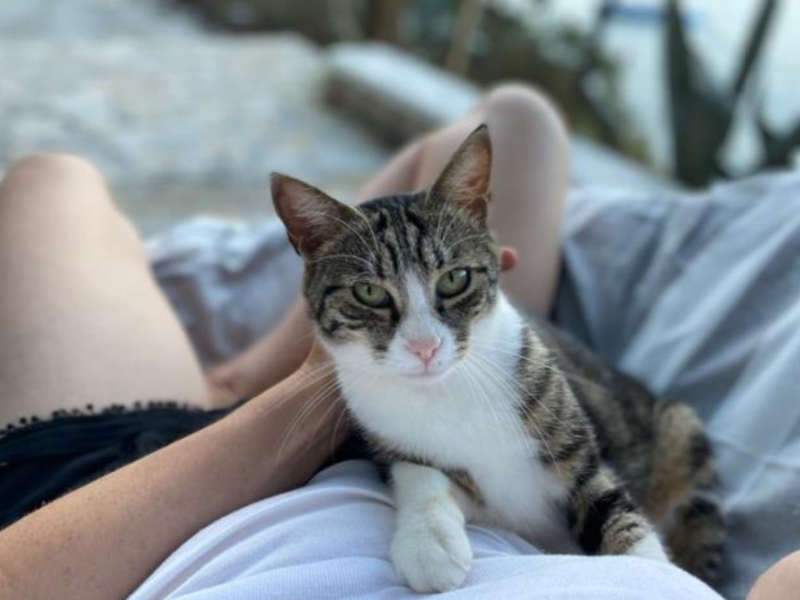
A week later, she found the fourth victim, Tootsi.
“He was a refugee from Milna, his clipped ear a sign that he had been one of many cats sterilized in a large ‘Trap Neuter Return’ effort, carried out by volunteers and paid for by the Municipality. He had only one eye, the other most likely shot with an air rifle, in some twisted version of target practice for hunters. Despite all this, he was sweet, friendly, and grateful for my care and affection. I found him under a bush, foaming at the mouth, crying in pain and fear. Again I rushed to the vet, but he was dead by the time I arrived.”
Kelly resolved to building a cat-proof fence on her property to protect her remaining cats, though work cannot begin until after the tourist season as building work is prohibited.
“At the same time, 2 cats disappeared. I never found their bodies. The death toll stood at 5. I thought that the opening of the tourist season would protect the remaining cats. Surely no one would drop poison around when so many people with young children and dogs were here enjoying their summer holiday! I underestimated the stupidity and savagery of the culprits.
Last week, I heard that more cats had been poisoned in Osibova. Orphaned kittens were found, some dead, some clinging to life. Three of my cats were missing.
I searched the neighbourhood for days until I found the body of my beloved Turtle. She crawled under the wooden kučica for cats that I built in my garden. There she died the same painful, terrifying death as the others.”
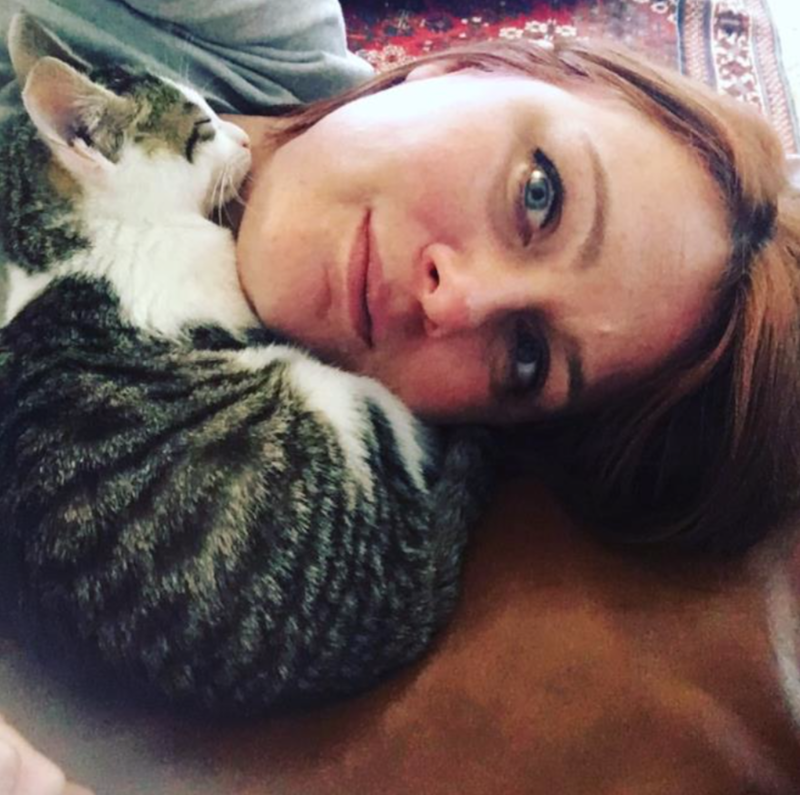
Shocked by Kelly's experience, I decided to take a poll of my Facebook friends to see who else has witnessed something similar. The situation in Slatine on Ciovo is no better.
"I would like to draw your attention to Slatine (Ciovo), where such a practice is repeated from year to year, on a much larger scale (although almost unknown to the general public). This year alone, already three times, dozens of cats have been poisoned. Non-selective poisoning, in public places, without warning and notice (and permission), which endangers both children and other pets. The motive is simple, out of season, cats are desirable because they 'control pests and snakes' everyone feeds them and lets them reproduce uncontrollably, and in season, they are 'enemy number 1 because tourists come,' and Slatine residents have no urge to keep the place clean, so cats gather in crowded containers in groups of up to 30," reads one message I received on Facebook. The source added that Slatine is officially part of the City of Split, and the Split district, which makes the story even crazier.
Unfortunately, it is known in the community that the police rarely act on reports of cat poisonings.
“Cat poisonings are amongst the major issues when it comes to animal welfare in Dalmatia. These atrocities happen regularly throughout the year, the work of psychopaths who go unpunished, with a big spike during the spring and summer months. The reason is that many accommodation and restaurant owners are convinced they need to 'clean the place of cats' so they don't bother tourists. This makes no sense whatsoever, given that the visitors love cats and seem to show a lot more empathy for them than most locals. Our association has reported dozens of cases to the police, but it is never taken seriously, and often, we are even laughed off. The authorities don't seem to think cats' lives are worth their time and resources,” said Tanja Vukicevic of the Split association Deseti Zivot.
Zdravko Podolski, a resident of Vrboska on the island of Hvar, has lost three cats to poisonings, oftentimes with no luck from the police - but that shouldn't discourage people from reporting.
"Always report, to grad/opcina, to police, to komunalno redarstvo, to drustvo za zastitu zivotinja. From the police, insist on a case number. If you have suspicions, share them. Nothing will happen the first few (or even many) times, but you can ask for a report, and you can set the press to ask," he says. Printing out articles in the media about poisonings and placing them in the mailboxes of suspects could work, too.
Parslow believes that if several people report the same crime, the police can do their job.
“People say the same thing to me over and over: don’t bother to report it because the police don’t care. This is not true at all. In my experience, the police care a lot and are always sympathetic. They can’t do anything if they don’t know the crimes are happening. By not reporting, people ensure that nothing will continue to happen. I always report to the police and the local municipality, but one report is not enough! If several people report the same crime, then there is more information for the police to work with. That is what happened in this case. The police told me that several other people had reported the same incidents of poisoning. Putting all the reports together gives the police a better picture of what is happening. Every piece of information, however tiny, is a piece of the jigsaw puzzle that can lead to prosecution.
There are several different routes to prosecution. An autopsy and toxicology analysis can be performed by the police crime laboratory, but it is very expensive, and citizens are usually expected to pay for it themselves. The poison itself is prohibited in Croatia and must be brought in from neighbouring countries with more relaxed laws. Anyone found in possession of the substance can be prosecuted. Offenders can be caught on video surveillance cameras, and some are even stupid enough to brag about their crimes, effectively confessing their guilt. I urge all concerned citizens to report these crimes. It takes a tiny amount of effort, and you might not see results immediately, but it is worth it.”
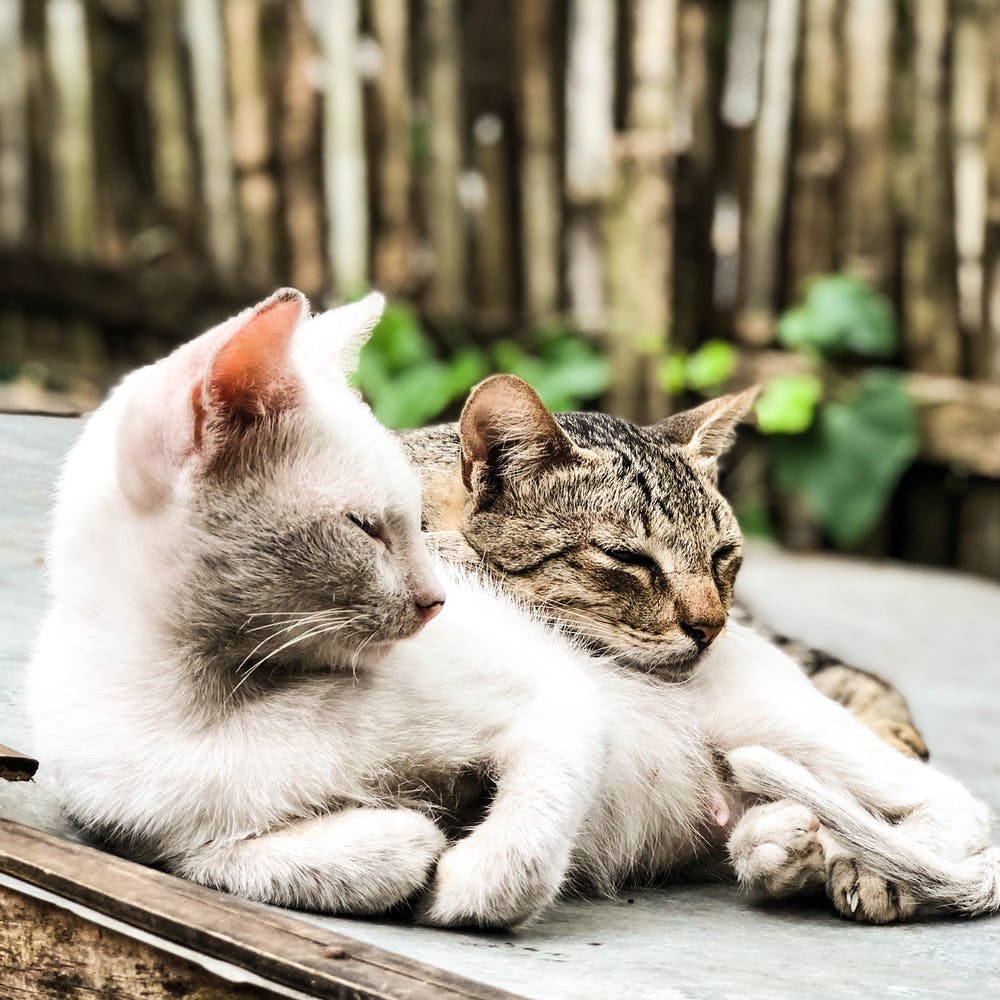
Pexels
I was shocked to discover just how many locals are unaware of what to do if they come across poisoned cats. One message last week from a local university student in the Visoka neighborhood of Split is an example.
"Someone in my street is poisoning cats, and I don't know what to do. I'm so sad about it because three already died."
According to Animal Friends in Croatia, if you are to witness an imminent threat to the health and life of an animal and severe abuse of an animal (including all forms of physical abuse), you are to call 192 and request the intervention of the police to prevent further endangerment of the animal and, if it is torture and/or killing the animal, file a criminal report.
A criminal report for abuse and/or killing of an animal should also be submitted by a witness of abuse/killing of an animal or a person who has information about it, in writing to the competent Municipal State Attorney's Office for violation of Article 205 of the Criminal Code. You can read more about it HERE.
Last week, a 61-year-old woman on the island of Hvar was caught by police for poisoning four cats. Some justice, finally, has been served.
“The people of Hvar are finally relieved: after a police investigation, the case of poisoning and killing cats, which had been buzzing in the news for days, was resolved. Allegedly, some tourists decided to leave Hvar after they came across the corpse of a cat in the yard of the apartment where they were staying, which horrified them so much that they packed up and left.
Although several killed cats were found in the town of Hvar in July, in yards and even in a net at sea, Hvar Police Station officers found that a 61-year-old woman from Hvar had killed four cats, which led to a report of the crime of killing or torturing animals. The competent state attorney's office was informed about the completion of the criminal investigation in a special report, as a supplement to the previously submitted criminal reports,” reads Slobodna Dalmacija’s release on the police report.
Killing or torturing animals in Croatia can see you imprisoned for up to a year.
Vivian Grisogono of Eco Hvar, an association helping to improve the health, environment, and conditions for animals on Hvar Island and beyond, suggests a way forward.
“One has to recognise why there's a problem and the valid reasons why some people object to having cats around their property. And then one can work out solutions, at least to some degree. Firstly, we feel that feeding stations with soil or sand areas for toileting would be a good start. Zagreb apparently has 40 of these. Such feeding points would make it easier to organise the sterilization of strays. Secondly, a satellite shelter (stacionar) would be excellent. One of our members has offered the use of some private land for this purpose, so we are now planning to create a satellite shelter under the aegis of the Animalis Centrum/Zaklada za zaštitu životinja Beštie) shelter in Kaštel Sućurac. It's quite a big undertaking, but is desperately needed.
Getting local authority support for these initiatives, including financial, would be the best possible positive result out of the tragic events of the last few months. Stari Grad, Hvar, and Jelsa have already taken positive action in financing cat sterilizations from their budgets, which was a big step forward, and is due to the initiative of Amanda Blanch and Chris Edwardes, who run the Hidden House Hotel in Stari Grad.
Restaurants and hotels would do well to join in the initiative - it would be good for their image, would help keep local cats under control, and would definitely please the many guests who come here and enjoy having cats around. Also, the cats are, of course, useful in controlling snakes and vermin.”
Amanda Blanch of the Stari Grad Kitten Fund believes we need to use the recent media attention to our advantage to keep the momentum around the issue going.
"There is momentum after the awful killings and torturing of cats in Hvar Town, and finally someone has been arrested. I have never gotten anywhere with the police or authorities on this, but they did finally listen about the Stari Grad Kitten Fund, and after three or more hard years, the mayor did put some money into the sterilization program. It is starting to get traction, and we must keep fighting for change and show people the benefits for them. Tourists prefer not to find dead or dying cats around, and there aren't as many cat feces around our area as the sterilization program worked, as we had fewer cats, mice, and snakes."
While Parslow has grieved eight lives this year, she fears that death could extend beyond cats, and tourism doomed on the island forever.
“The poison, in this case, is a powerful neurotoxin, which usually kills in minutes. It is extremely dangerous to all life, including humans. I fear that if this is allowed to continue, one day, a small child will be killed. Toddlers explore their world by putting things in their mouths. Imagine if the child of a tourist is poisoned in beautiful Osibova. Tourism would be destroyed here forever.
People say it’s the older generation who poison cats. They don’t know and can’t afford any other way of controlling the cat population. This is not always the case and certainly not the case here. The culprits are not old, they are not even from Milna. They are property owners who make a lot of money from tourism. They will destroy anything which gets in the way of their profit. They don’t understand that tourists from other countries do care about animal welfare and would be horrified to learn that cats are tortured and killed for their benefit. They don’t care about the very thing which draws those tourists: the incredible natural beauty of this region.”
If you'd like to get involved by helping the animal associations of Croatia, follow TCN's dedicated page.
For the latest travel info, bookmark our main travel info article, which is updated daily.
Read the Croatian Travel Update in your language - now available in 24 languages
Animal Shelters and Associations in Croatia: Eco Hvar
May 21, 2020 - What is the situation with animal shelters in Croatia in the corona era, and who is looking after the animals? A new TCN series meets the volunteers behind the animal shelters and associations around Croatia. Today, TCN meets Eco Hvar on the island of Hvar.
There are hundreds of incredible shelters and associations in Croatia working tirelessly, with little to no support, to ensure no animal is left behind. In a new TCN series, we meet the people behind the animals.
Today, TCN meets Eco Hvar on the island of Hvar.
First, tell us a bit about the history of your shelter/association.
It all started in September 2004 with Babe, the dog who should have been a rose. My Croatian isn't that good, despite my being a member of Dalmatia's oldest surviving noble family. But it wasn't due to linguistic failings that I set out to buy a rose and came back with a black labrador called Babe. The scorn that was heaped on me for my poor grasp of the language after this incident was unjust. No, I wasn't looking for a dog-rose. And rescuing Babe wasn't all my fault either.
It happened like this: my distant relative Igor Skelin runs Jelsa's garden centre, a place where one could buy plants, including roses, but not dogs. Babe belonged to Branko, one of Igor’s staff, and was generally to be found in the hot-house sitting quietly under the table or wandering around, causing no trouble to anyone. She was a beautiful, nicely mannered and contented dog, as labradors tend to be.
On this particular Saturday morning she was sitting under the table looking unusually morose. No sign of Branko, so I asked after him. Igor told me that he was very ill in hospital, and had asked Igor to find Babe a good home or have her put down. Babe had been in the care of one of Branko’s relatives, but had run off and gone missing for several days. Today she had reappeared at the garden centre, totally unexpectedly.
The news was a shock. I digested it for a few moments. I had a sense of some inescapable destiny. I looked at my brother, another Branko. He looked at me. Dog-lovers both, the pulling on heart-strings was almost audible. We had a short silent consultation, and he willed me forward. Easy enough for him, he would be leaving shortly for the UK, leaving me holding the Babe. “Well,” I said slowly, “If you really can’t find her a home, let me know, perhaps I…” Igor was on the case like a shot. Announcing that there was no chance of anyone else taking her on, he opened the car door and Babe hopped inside.
Roses were forgotten and we headed off home. I was musing, rather late in the day, on whether Babe would fit in. I had brought with me two dogs from the UK when I had relocated to Dalmatia earlier in 2004. They were both females, and used to having their territory to themselves. How would they take to the new arrival? Would they fight? And what’s more, one was called Beba, there could be a confusion of identities. The chain of command would be difficult to maintain. Oh dear. My low spirits sank another notch when Bella and Beba greeted our arrival with resounding hostile barking.
To my surprise, all went well. The barking subsided when the two realized Babe was coming in. Babe entered, there were introductions all round, tails wagged, and she settled in without a hitch. Perhaps Bella and Beba recognized a kindred spirit, as their mother Connie was a labrador, albeit golden rather than black. Babe lived on happily for several years in Pitve, and eventually died naturally and peacefully in her sleep. Happily her former owner Branko recovered from his illness and returned to the island, although he was unable to take Babe back.
So began the influx of canine intruders into our peaceful home in Pitve. And, yes, my Croatian has improved in the interim. No, I have not set out to buy a rose since. But every year there are homeless or unwanted dogs wandering around the island, and I have taken in as many of them as I could manage at any given time. Sadly, I have been forced to leave even more to their fate.
There are just too many unwanted dogs being born on the island, or in some cases being brought here. There is no organization on the island responsible for caring for these poor animals. It seems this is a problem throughout Dalmatia. The obvious thing to do was to establish a framework in order to carry out projects which would address the problems. This is how ECO HVAR for Animals, now a registered charity, was born.
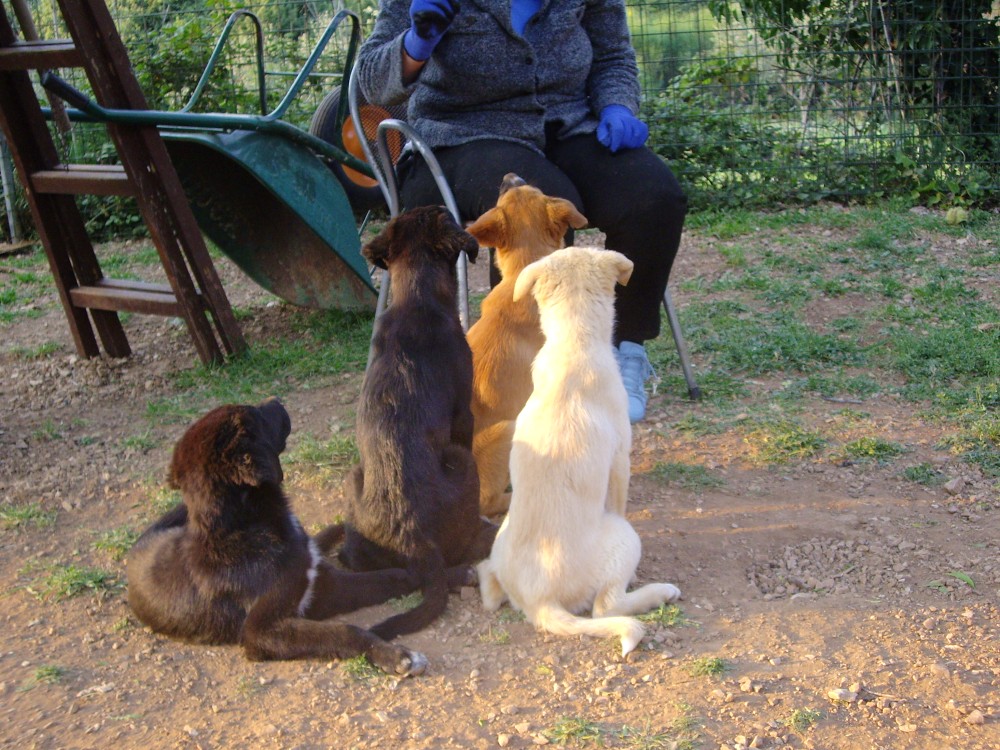
How many animals do you currently house? What is the largest number of animals you’ve taken in?
I am currently looking after 20 dogs, 13 of them puppies, due to the COVID-19 blockage of our usual channels for passing them to the shelter. In my village, we (3-4 of us) also feed stray cats.
How do you get animals you've taken in to their new owners? Do you connect animals with owners only in Croatia or abroad, too?
Occasionally, we find new owners for dogs and cats on the island, but mostly we coopoerate with the Bestie Animal Shelter in Kaštel Sućurac on the mainland. Often the dogs are taken abroad, and in all cases we follow their progress as far as we can. The Bestie animal shelter is exemplary: full care and kindness; a volunteer programme; educational visits for children; socialization for the rescue dogs; walks and summertime swimming sessions. You can see a little of their work on their fb page.
**TCN also has an interview with Zvonimir, the owner of Bestie, coming up!
Stari Grad Cat & Kitten Fund on Facebook - Last year Jelsa Council agreed to do the same.
How much does sterilisation usually cost? Do vets offer discounts for street cats or special circumstances?
The local vet does give a discount for this: the local Councils have an annual contract with the vet, covering sterilizations for a certain number of cats at set fees. (Costs c. 250 - 400 kn, varies according to male/female, pregnant or not). In cases of hardship, they may also offer a discount for street cats which are brought in by recommendation from Eco Hvar.
You can find our recommendations on how to help cats on the island HERE
Poisoning street cats is another issue in the area. Is this considered a crime in Croatia? Where should someone report this should they witness it? Are there fines/punishments in place?
Animal poisonings are a problem. In principle, it is a punishable offence under the Law for the Protection of Animals. In practice, it is down to individuals to make a complaint to the police and local komunalni redar / town warden, name possible suspects, and provide proof, which obviously involves financing an autopsy on the dead animals. This last is an expensive process, especially from the island. In a small place, the poisoners are usually easily identifiable, but few people want to come into conflict with their neighbours by raising a case against them which will take years to resolve through the courts.
You can read more about this issue HERE
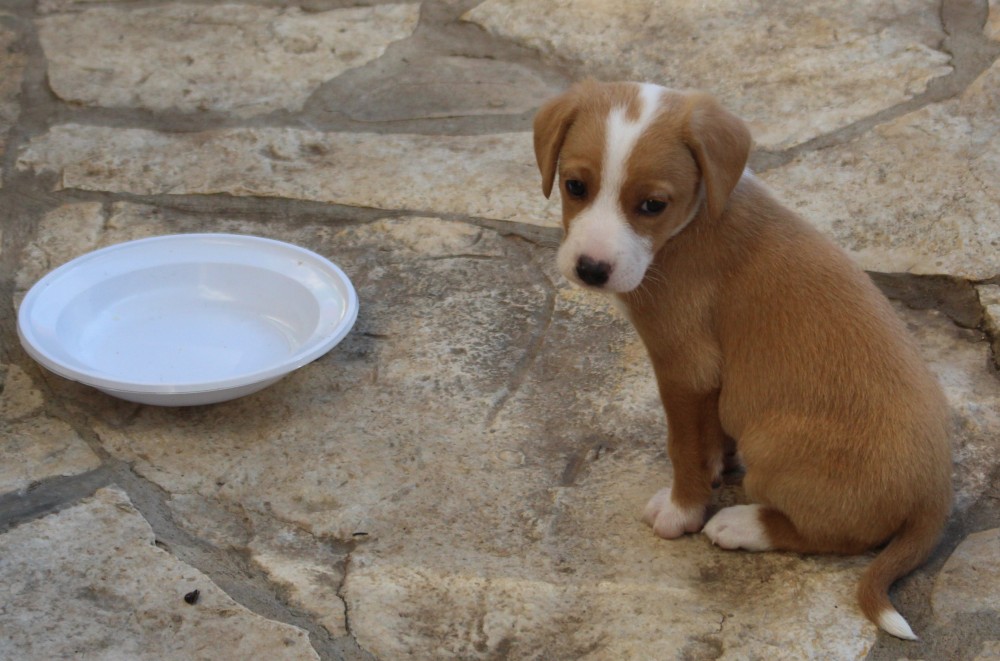
What about the treatment of dogs?
One special problem is the treatment of hunting dogs, who are ill-treated, starved or and/or abandoned without mercy by many owners. We do our best to save the ones we can via the inspectors, but it is extremely difficult. They need special rescue facilities, which I would dearly love to establish.
You can find our recommendations on how to help dogs on the island HERE
Can you explain the process of fostering animals with your shelter/association?
Fostering is well organized in Zagreb, but not formally here. Both fostering & homing stray or unwanted animals are difficult on an island with a limited population, and even more limited number of animal lovers.
Do you receive any support from the city, county, or state? If so, how much/in what way?
Our charity does not receive support from any public body, but relies solely on donations, so far. Our money is mainly spent on placing dogs in the animal shelter, and financing medical costs and sometimes sterilizations for low-income owners/carers.
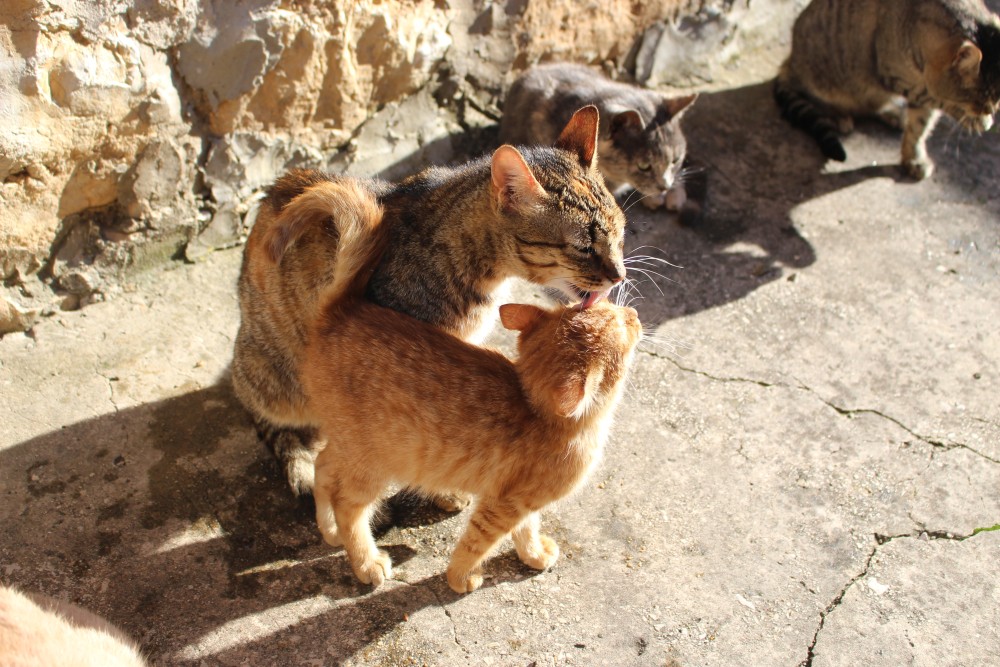
What are the best ways the local community and people from abroad can get involved?
Eco Hvar welcomes everyone who wishes to support our work in any way. There are no membership fees. If you wish to become involved, or simply to demonstrate support of our aims, please print out and fill in the application form and post it back to our address: Pitve 93, 21465 Jelsa, Croatia / Hrvatska. For speed, you can email us your details, or scan the signed form back to us on our email contact address, although the original is appreciated!
You can learn more about Eco Hvar on their website.
Do you have an animal shelter or association in Croatia and want to share your story? Get in touch at This email address is being protected from spambots. You need JavaScript enabled to view it..
To read more about lifestyle in Croatia, follow TCN's dedicated page.
"Red Cross in a Blue Frame" Eco Action Held on Hvar
The ecological project "Red Cross in a Blue Frame" continued on Hvar last weekend.
Jelsa Mayor Nikša Peronja Against Pesticides
A wonderful initiative from Eco Hvar to raise awareness about the effects of pesticides on our health - a statement signed by both the President of Eco Hvar Vivian Grisogono and the Jelsa Mayor Nikša Peronja on Monday, April 11. 2016.
The Dangers of Pesticides: An Interview with Eco Hvar
The island of Hvar is a natural paradise, famous for its lavender, olives, wine, sunshine and temperate. The idyllic pictures it not completely rosy however, due to various environmental practices. TCN sat down with Eco Hvar founder Vivian Grisogono on January 15, 2016 to find out more on the devastating effects of pesticides.


